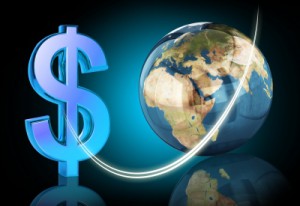The U.S. dollar is getting perilously close to losing its status as the world's reserve currency, and the current nuclear deal with Iran could push it over the edge.
For years much has been written about the risks from debasing our currency as a result of deficit-spending, debt-accumulation and reckless money-printing. What's vital to grasp now is that Americans will experience an abrupt decline in living standards once the dollar loses its status as the world's reserve currency.
Worse, the dollar's demise would also precipitate a new financial crisis — one that would make the 2008 collapse look like a summer storm.
The U.S. is a relatively benign economic world power. No one knows what it would be like if, say, the Chinese yuan becomes the reserve currency for global trading. But it's apt to be far less benevolent than the dollar norm we all now just take for granted.
Saudi Arabia's top trading partner for oil is now China — a country outspokenly hostile to the U.S. dollar remaining the world's reserve currency. The House of Saud also sets the rules for OPEC, and is now threatened by President Obama's pursuit of a nuclear deal with Iran.
Additionally, the fracking revolution has hurt OPEC by driving oil prices down, while weaning the U.S. from remaining an OPEC customer.
Understanding how the dollar became the world's reserve currency is essential in order to grasp the risks we face today. When President Nixon suspended the convertibility of the dollar into gold in August 1971, there were immediate negative repercussions in the currency markets.
That move effectively ended the relative stability of the gold-backed Bretton Woods international currency regime and ushered in the instability of fiat currencies and floating exchange rates. This, combined with the inflationary effects of the oil embargo, caused precipitous weakness in the dollar.
In an effort to restore stability, in 1973 Nixon sent Secretary of State Henry Kissinger to negotiate with the House of Saud. A deal was struck to price oil in dollars in exchange for a U.S. commitment to defend Saudi oil fields. This led other OPEC countries to follow, which is how the petrodollar trading regime came into being and then expanded to include other commodity trading.
This ultimately resulted in the U.S. dollar becoming the world's reserve currency — providing a key support for the dollar relative to other currencies in the global economy for the last four decades.read the rest of this op-ed HERE.
If you like what you see, please "Like" us on Facebook either here or here. Please follow us on Twitter here.







No comments:
Post a Comment